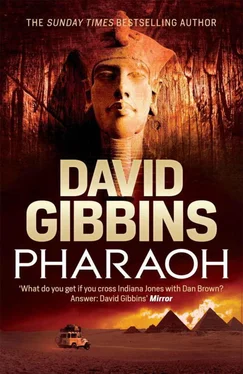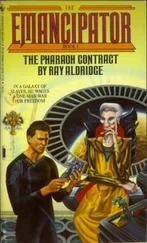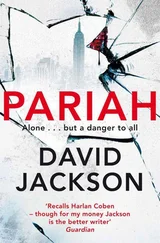‘And the spot where the sniper may have died,’ Jack said.
‘How can you know that?’ Costas asked.
Jack picked up the Martini-Henry cartridge again, and turned to Hiebermeyer. ‘Did you find any more of these?’
Hiebermeyer shook his head. ‘That came from where you’re standing, and we swept the entire sangar with a metal detector. My friend told me that the British generally didn’t collect their cartridges after use. Any expended cartridges here would probably quickly have been trampled into the dust underfoot, and not been visible to locals who might have come scavenging this place afterwards.’
Costas looked around. ‘Yet if this was a sentry post, there’d be at least a couple of guys here at any one time, and if they were being sniped at, you’d expect them to fire a barrage of rounds at that cliff.’
Jack narrowed his eyes. ‘I think there was someone here who knew his business, and got them to hold their fire. I think he was a skilled sharpshooter himself. He would have known he had only one chance before his opponent moved. One shot, one kill.’
‘One down on each side,’ Costas said. ‘Even score, nobody wins.’
Jack looked pensively back at the cliff. ‘A single sniper up in those cliffs could have held back the British column for hours, inflicting officer casualties and battering the morale of exhausted men who must already have been questioning the worth of what they were doing. So despite the casualty here, I think that if the dervish sniper was killed, then it was one up for the British.’
Hiebermeyer replaced the finds tray and stood up. ‘Except that two men were killed that day in this sangar.’
Jack stared at him. ‘How do you know?’
Hiebermeyer made his way out of the section and into the pit, and then leapt up on the wall again. ‘This is where it gets really fascinating, because what we’ve found takes us back from 1884 almost three thousand years. But before then, we’re going to meet up with Aysha and hear her take on all this. After all, it is her site.’
Jack climbed up to the rim of the sangar and stared to the south. He could hear the helicopter drumming along the course of the Nile, and he wondered how much deeper the echo would have sounded a hundred and thirty years earlier, before the Aswan dam had been constructed and the river level raised. He looked into the waters now, imagining the gorge as it had been then: the rocks with the torrent in between, the boats queuing up awaiting their turn to be hauled through the cataract, the shouts and singing of the men below, British and Canadian, west African and Egyptian and Sudanese. He turned back and looked at the sangar again, and thought about how thin the veil of dust was that lay over the detritus of the past in the desert, how quickly it reduced everything to the same level: the remains from that day in 1884 could be as old as the ancient Egyptian walls that surrounded them. Yet the absence of any overburden, of any stratigraphy, also meant that the past was immediate, and he could almost put himself back there on that fateful day, hear the screams of the soldier who had been hit and lay dying in the dust in front of him, and see the man with the rifle who had lain against the parapet and fired at the far cliff. In the blink of an eye their modern clothes could become the khaki of a hundred and thirty years earlier, and in another blink the skirts and sandals of the ancient Egyptian soldiers who had manned this outpost three thousand years before that, all of them sharing the same apprehension about what lay through the pall of dust beyond the horizon to the south.
He took a deep breath, smelling the tang of the desert and the acrid odour of camel dung, even imagining he had caught a sulphurous whiff of gunpowder. He felt as if another deep breath would suck in that veil and he would take the past within himself and step out into that day in December 1884. For a few moments he had not only seen the sharpshooter but become one with him, focused on the only things of importance at that moment: the balance of the rifle, the view through the sights, the measured pace of his breathing, the touch of his finger on the trigger. Jack wondered who the man had been, whether he would ever know his name.
He took a water bottle from his leg pocket, unscrewed the top and offered it to the other two. Costas took a mouthful, and then Jack drained the rest and replaced it in his pocket, screwing back the top as he did so. The drumming of the helicopter became a roar as it settled into its landing site, the whirling of its rotor blades just visible through the storm of dust created by the downdraught. It powered down, and Jack turned to the others. ‘I’ll give Ibrahim about an hour to offload the equipment with the crewmen. It’s his operation and I don’t want to interfere. But as soon as he calls through, I’m on to it. I’m itching to dive.’
‘Roger that,’ Costas said.
Jack turned to Hiebermeyer. ‘Does that give us enough time?’
Hiebermeyer paused. ‘I hope so. There are rogue elements in the regime here who could shut us down at any moment. There’s a lot simmering just beneath the surface in the Sudan: warlords, fundamentalism. We’re just trying to pack as much as we can into every day while we’re still able to work here.’
‘Where’s Aysha?’
‘At the Senusret shrine. Once we’ve talked to her, I’ll finish showing you what we’ve found. It’s fabulous stuff, one of the most exciting discoveries ever made in Egyptology. Follow me.’
PART 2

Near the third cataract of the Nile, Sudan, 23 December 1884
Major Edward Mayne of the Royal Engineers pushed the white cotton of his scarf up over his nose, leaving only a narrow gap beneath his headdress to see through, and pressed his heels into the flanks of his camel. He lurched forward as it swerved into a shallow gully, picking its way among the exposed bedrock that provided a surer footing than the loose shale and dust of the surrounding desert. Over the last two weeks he had learned to move in rhythm with the beast, becoming one with it as his guide had taught him, leaving him swaying like a sailor on land when he dismounted to take measurements and sketch the rocky course of the river through the cataracts, noting the places where boats might be hauled up against the current. The day before, a messenger had reached him with orders to return to the main camp of the river expedition and report to headquarters, and he and his guide had ridden hard that morning to reach the camp before the midday sun made travel intolerable. He knew that Corporal Jones would be waiting for him in the sangar dugout, where he had left him with the sentries overlooking the camp beside the Nile. As he got closer, he had made sure to avoid the deep gullies so that he was always exposed to view. Over the past weeks Mahdist sharpshooters had begun to inflict casualties on the river column, and he knew there would be jittery trigger fingers at the sight of anyone wearing Arab dress approaching on a camel.
He looked back to the east, where he had parted ways with his guide, Shaytan Ahmed al-Abaid, a chieftain of the Dongola people of upper Nubia, who had accompanied him on his foray into the desert. The previous evening they had huddled over the embers of their fire beside the wells of Umm Bayaid, concealed within a rocky gully from prying eyes, and had talked together until the last vestige of heat had left the rocks and they had lain to sleep on the hard ground, keeping close to their camels for warmth. Shaytan had been an interpreter for General Gordon in Khartoum, and had only left three weeks before, when Gordon had ordered him out of the city for his own safety. The Mahdi’s forces had blocked the main exit routes, and Shaytan had only made it through by disguising himself in the patched jibba robe of an Ansar warrior, the most fanatic followers of the Mahdi. He had travelled to General Wolseley’s headquarters at Wadi Halfa, some two hundred miles north on the Egyptian border, and offered his services to the expedition that was now inching its way south along the Nile in a forlorn attempt to relieve Gordon. In the careful ways of desert dialogue, in a wide-ranging discussion over cups of strong tea, Mayne had extracted from Shaytan all he could about Gordon’s state of mind. Shaytan’s account was dispassionate, the most up-to-date he had, and was not clouded by the prejudgements of British intelligence officers that had made it difficult for Mayne to get a good grasp of the man. That evening’s discussion had been the most valuable outcome of his foray into the desert; forward reconnaissance of the Nile had anyway seemed of dubious value in light of the probability that the river column would never reach Khartoum in time to save Gordon.
Читать дальше













